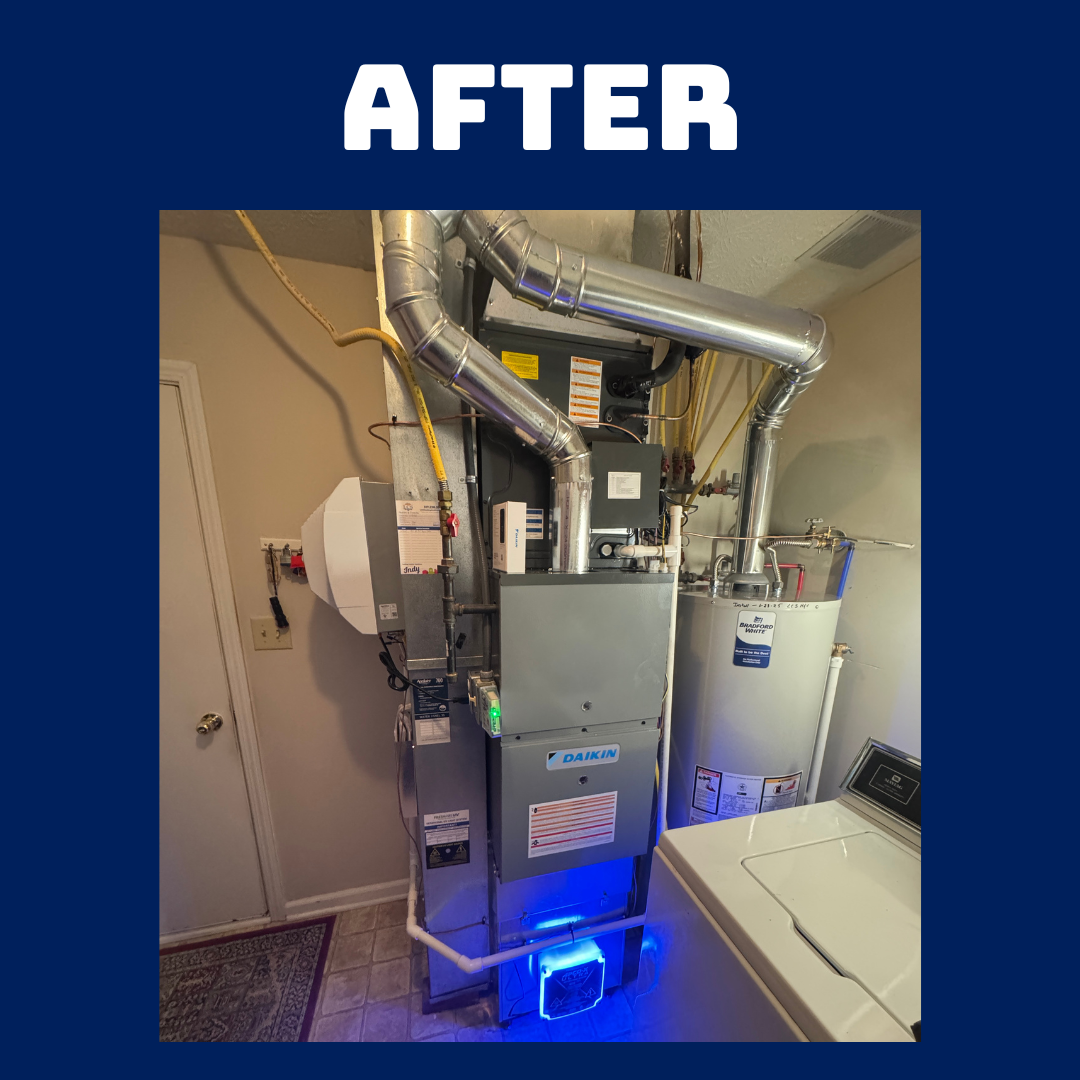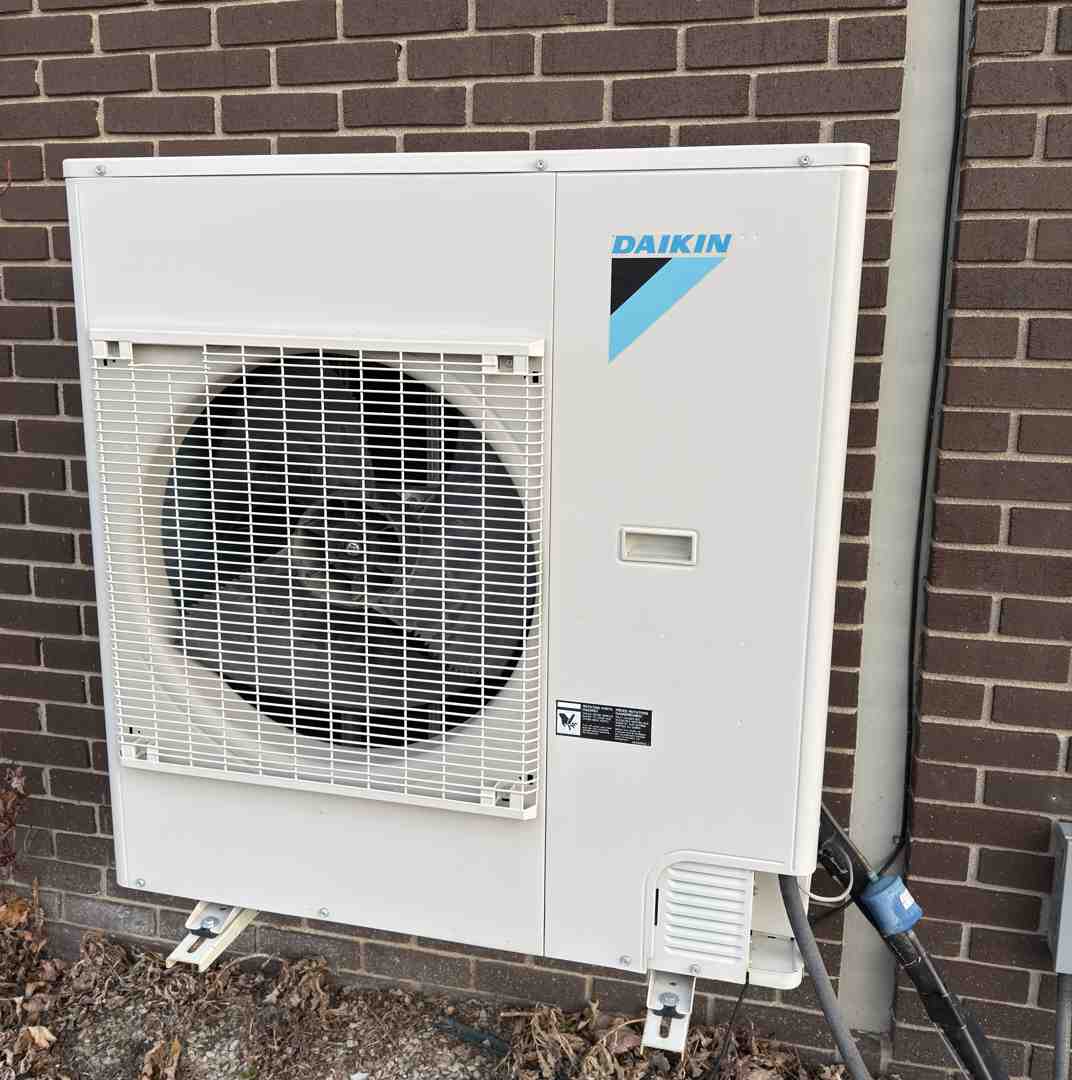Hot Deals on Furnaces: Discover the Best Shops Near You
Why Finding the Right Furnace Shop Matters for Your Home's Comfort
When searching for furnace shops near me, Indianapolis homeowners need a reliable partner for high-quality heating systems and professional installation. The right furnace shop combines expert product knowledge with certified technicians and comprehensive warranties to ensure your investment delivers lasting comfort for years to come.
Top types of furnace shops to consider:
- Local HVAC specialists - Licensed contractors offering personalized service and local expertise
- Major home improvement retailers - Stores like Home Depot with 12 furnace models and installation services
- Manufacturer showrooms - Brand-specific locations with specialized product knowledge
- HVAC supply stores - Professional-grade equipment suppliers, some serving homeowners
Your furnace choice affects your family's comfort for the next 15-20 years. Gas furnaces are common in cold climates like Indianapolis, while electric furnaces offer longer lifespans of 20-30 years. High-efficiency models cost more upfront but deliver significant energy savings over time.
Finding the right shop means getting proper sizing, professional installation, and reliable warranty support. Licensed, bonded, and insured contractors with NATE-certified technicians protect your investment and ensure quality workmanship.
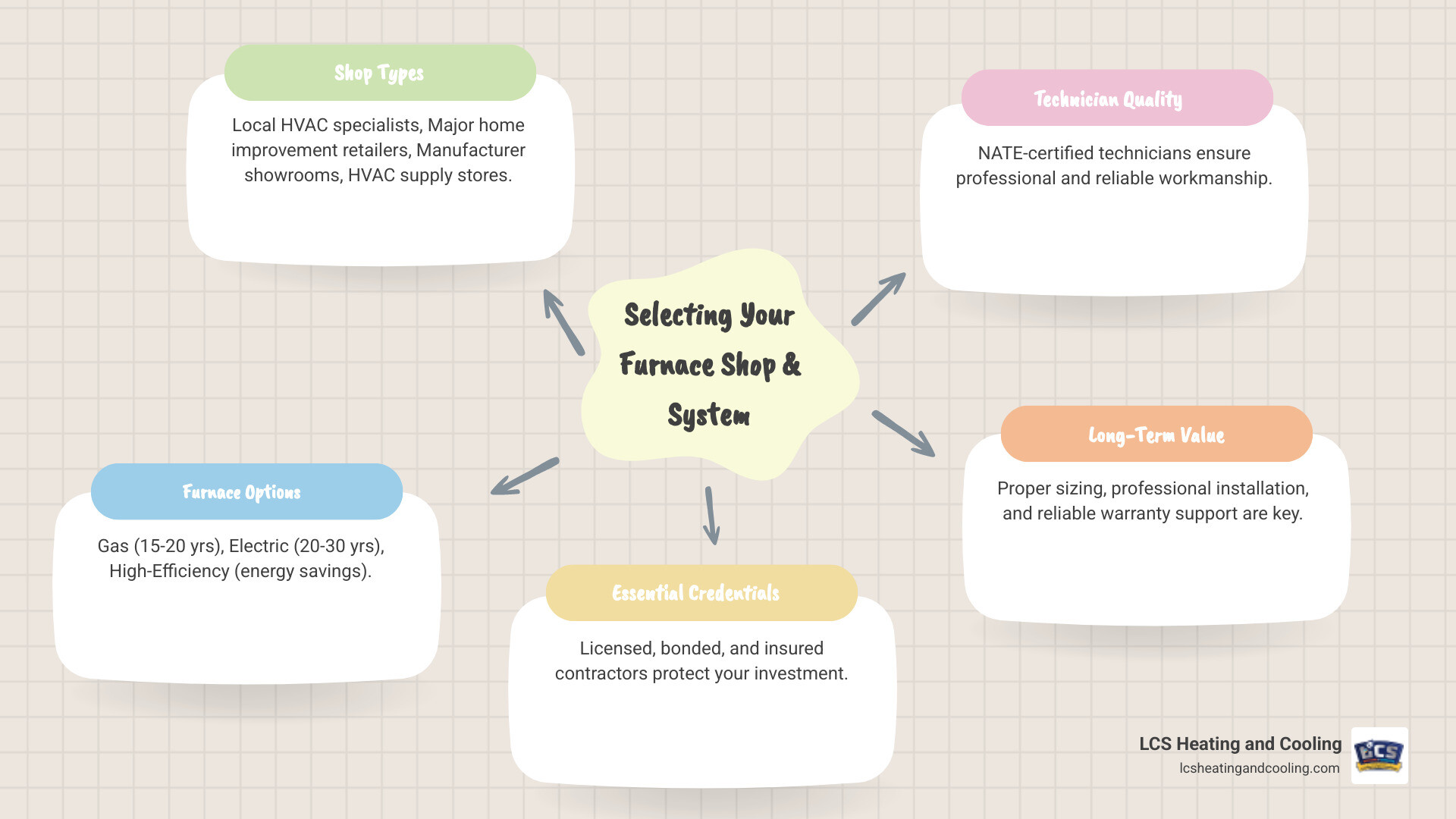
Understanding Your Furnace Options
Choosing the right furnace is like finding the perfect winter coat for your home: you want the right fit for maximum comfort and efficiency. When you visit furnace shops near me, you'll typically encounter gas, electric, and oil furnaces, along with the increasingly popular heat pump alternative.
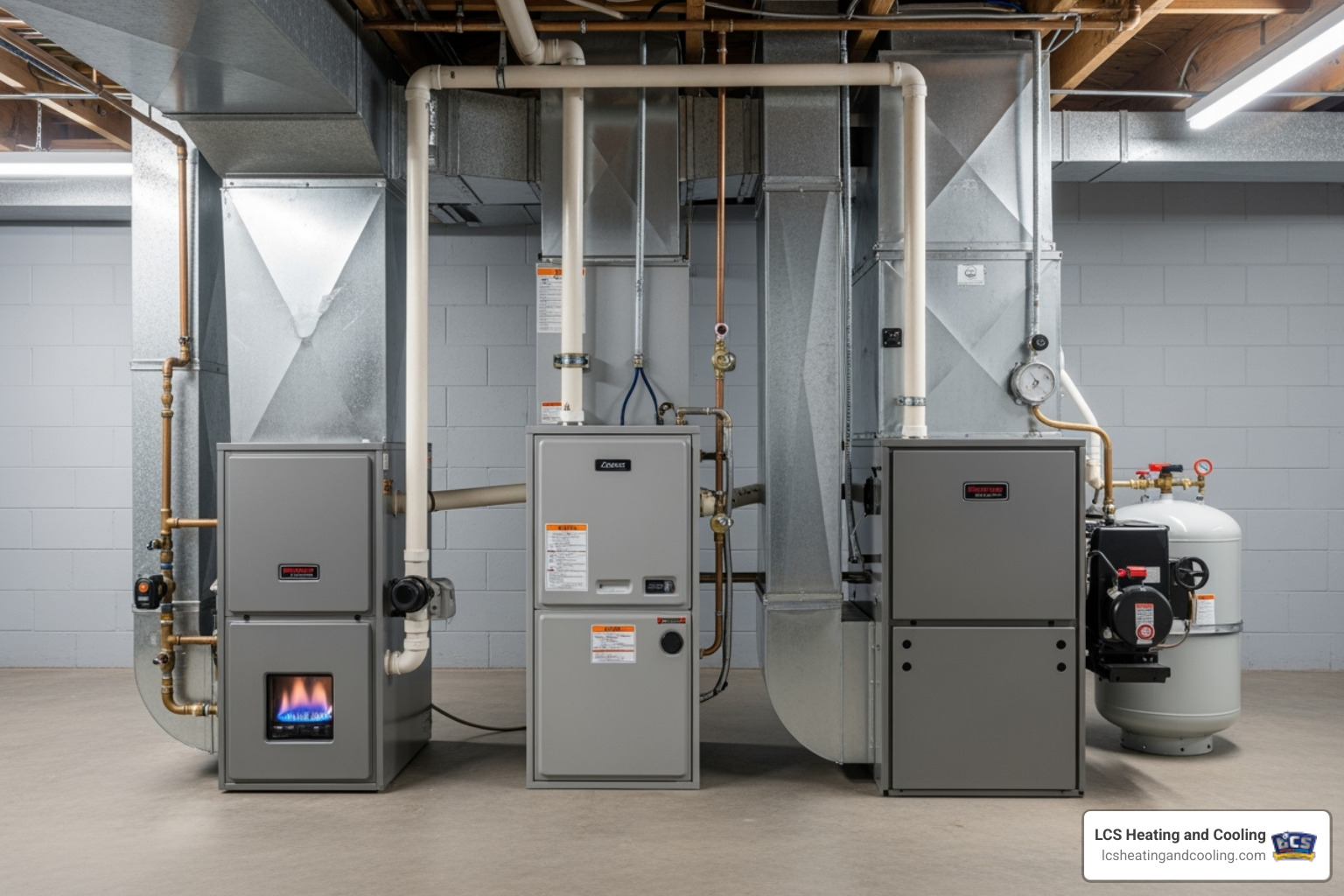
Gas Furnaces
Gas furnaces are a popular choice in Indianapolis and surrounding areas like Carmel and Fishers. They burn natural gas to create heat, offering lower operating costs since natural gas is often cheaper than electricity. These units deliver high heating capacity, warming your home quickly even on the coldest days. However, they require a gas line, and professional installation is crucial for safety to prevent carbon monoxide or gas leaks.
Electric Furnaces
Electric furnaces use heating elements to warm air, offering a simple and dependable solution. Their lower upfront cost and easier installation are attractive, as they don't require gas lines or complex venting. A key advantage is their incredible durability, with lifespans of 20 to 30 years. They are also very safe, with no risk of carbon monoxide. The main drawback can be higher operating costs, depending on local electricity rates.
Oil Furnaces
Oil furnaces, while less common today, are powerful heaters that burn heating oil stored in a tank on your property. They provide high heat output and don't depend on a municipal gas line. However, they typically have higher upfront costs, a shorter lifespan of 16 to 20 years, and require managing fuel deliveries and storage.
Heat Pumps as an Alternative
Heat pumps are highly efficient, multitasking systems that heat your home in winter and cool it in summer. Instead of generating heat, they move it, which can lead to lower utility bills. This dual functionality provides year-round value. While the upfront investment is higher and they may need a backup heat source in extremely cold weather, their energy efficiency makes them an excellent, environmentally friendly option.
At LCS Heating and Cooling, we help Indianapolis families steer these choices to find the perfect fit for their home, budget, and comfort needs.
How to Choose the Perfect Furnace for Your Home
Finding the perfect furnace isn't about picking the biggest model; it's about matching the unit to your home's specific needs for long-term comfort and efficiency.
Sizing Your Furnace
When it comes to furnaces, bigger isn't better. An oversized unit will cycle on and off too frequently, causing temperature swings and unnecessary wear. An undersized unit will run constantly, struggling to heat your home and driving up energy bills. That's why professional furnace shops near me perform a Manual J load calculation. This detailed assessment considers your home's square footage, insulation, windows, and layout to determine the precise heating capacity needed, measured in British Thermal Units (BTUs).
Understanding AFUE Ratings
An AFUE (Annual Fuel Utilization Efficiency) rating measures how efficiently a furnace converts fuel into heat. A furnace with an 80% AFUE rating turns 80 cents of every dollar into heat, with 20 cents wasted. High-efficiency furnaces with 90%+ AFUE ratings convert 90 cents or more into warmth. While they cost more upfront, their lower operating costs lead to long-term savings. You can learn more about purchasing energy-efficient residential furnaces from the Department of Energy.
Smart Thermostat Compatibility
Modern furnaces pair with smart thermostats to optimize comfort and energy use. These devices learn your schedule, adjust temperatures automatically, and allow for remote control via your phone, adding a layer of intelligence to your heating system.
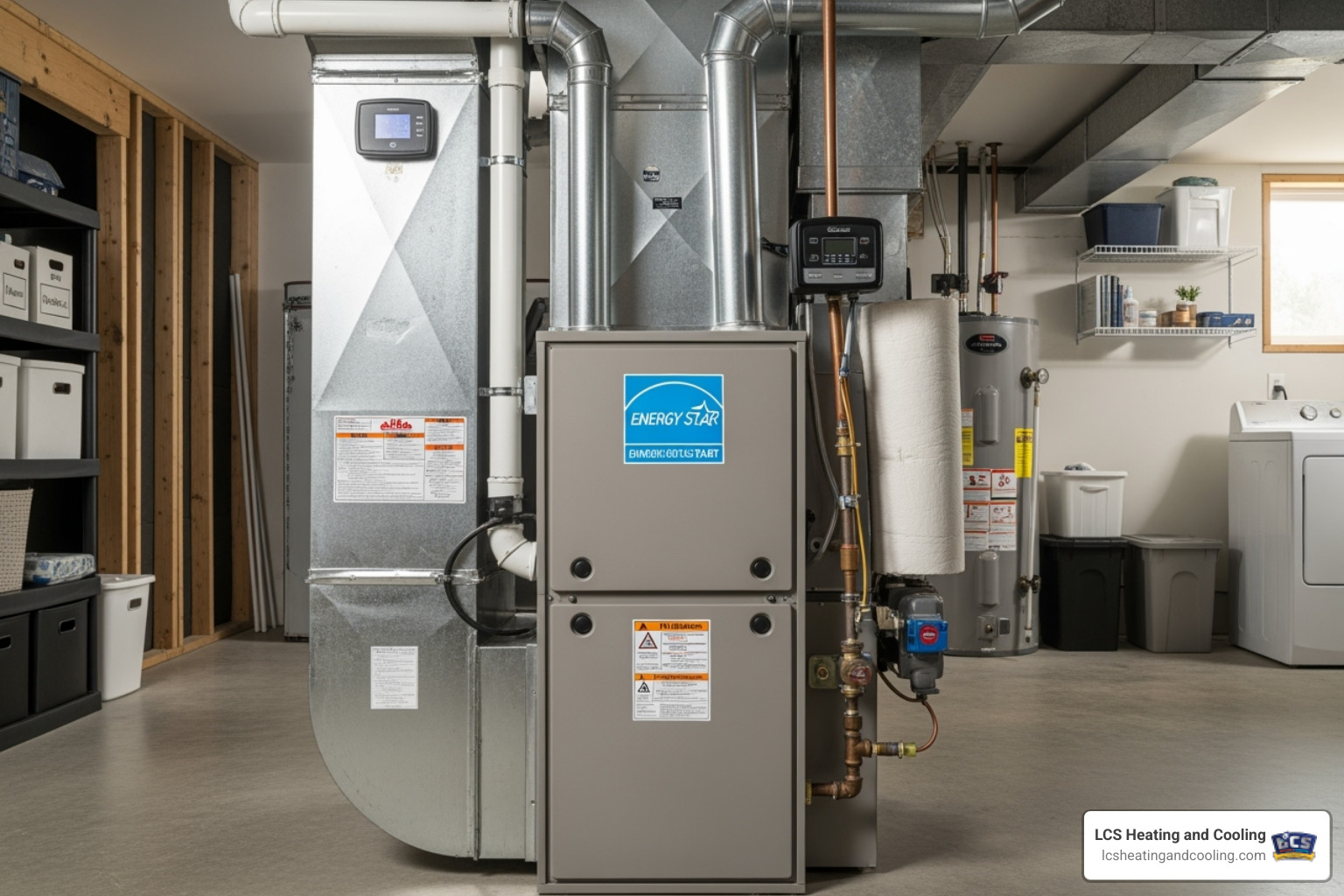
Understanding Furnace Efficiency
Furnaces have different operating styles that impact comfort and efficiency:
- Single-stage furnaces operate at full capacity only. They are either on or off, which can create noticeable temperature fluctuations.
- Two-stage furnaces have a low and high setting. They run on the lower, quieter setting most of the time, providing more consistent heat and switching to high gear only on the coldest days.
- Modulating furnaces offer the most precise comfort, adjusting their output in small increments to exactly match your home's heating needs. This results in the most consistent temperatures and highest efficiency.
The long-term energy savings from a two-stage or modulating furnace often justify the higher initial cost. Advanced features like inverter systems enable these precise adjustments. You can learn more about advanced inverter technology and how it improves performance.
Finding Reputable Furnace Shops Near Me
When you need a new furnace, you're not just buying equipment; you're choosing a long-term partner for your home's comfort. Working with local HVAC experts is a significant advantage, as they understand the specific challenges of Indianapolis winters and the heating needs of homes in our communities.
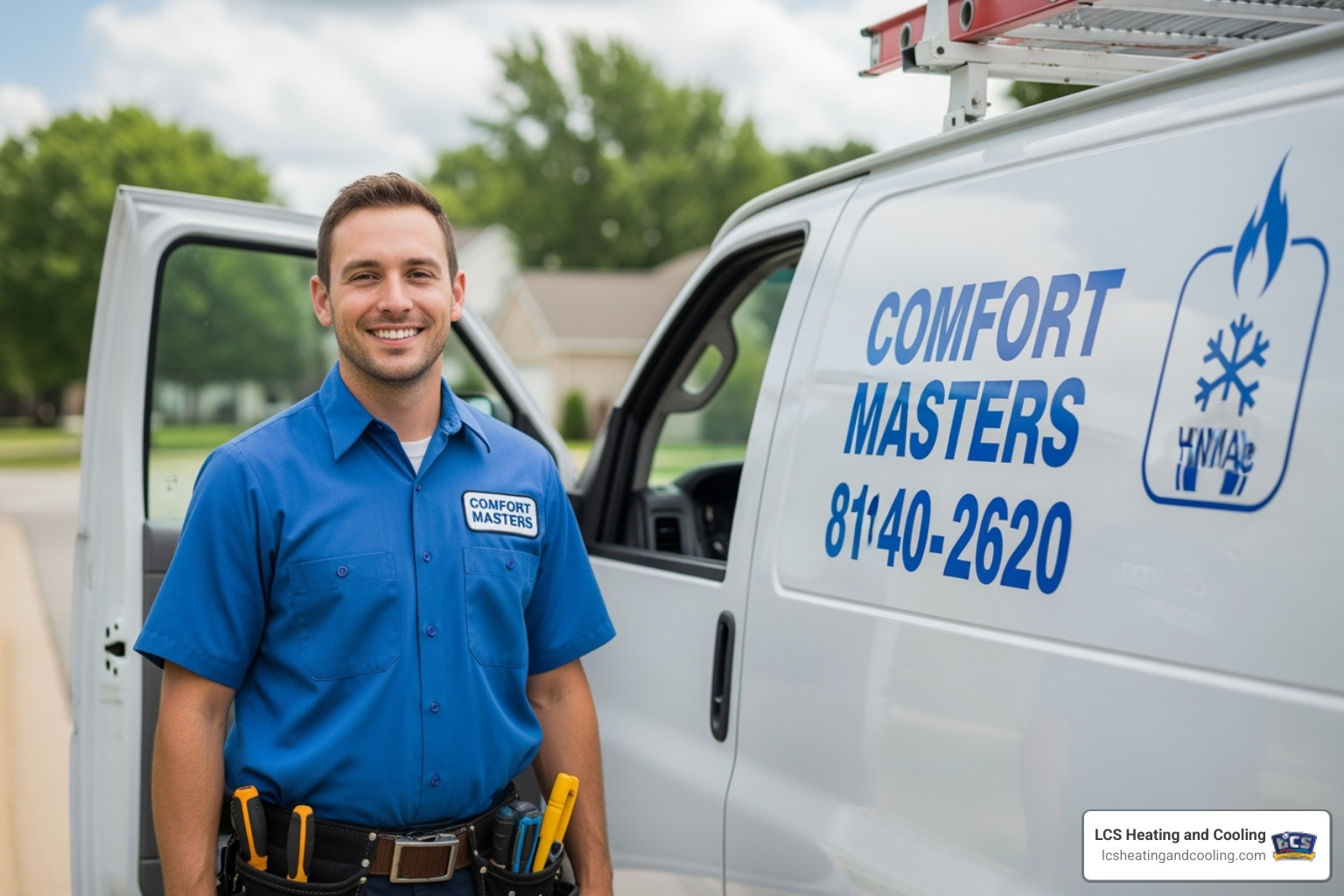
Start by checking credentials and reading customer reviews to gain insight into a company's reliability and service quality.
What to Look for in "Furnace Shops Near Me"
- Licensed, bonded, and insured: This is non-negotiable protection for you and your home. It ensures the contractor meets state requirements and that you're covered if anything goes wrong.
- NATE-certified technicians: NATE certification is the industry's gold standard, signifying that technicians have proven their expertise through rigorous testing.
- Free, no-obligation estimates: Reputable companies are confident in their pricing and expertise, offering free in-home consultations to provide an accurate quote without pressure.
- In-home consultations: A proper assessment is crucial for correct furnace sizing. A company that quotes over the phone without seeing your home is cutting corners.
- Strong product and labor warranties: A good warranty shows that the company stands behind its products and installation quality, giving you long-term peace of mind.
Questions to Ask Potential "Furnace Shops Near Me"
Once you have a shortlist, ask these questions to find the best fit:
- What is your experience with installing furnaces in homes like mine?
- Which brands do you service, and why do you recommend certain models?
- What is the estimated project timeline from start to finish?
- Do you offer post-installation support and maintenance plans?
- What financing options are available?
The right furnace shop will be a long-term partner, so take the time to find one that earns your trust.
The Furnace Installation Process Explained
Working with professional furnace shops near me makes getting a new furnace a smooth and straightforward process. Here’s what you can expect.
The Home Assessment
The process begins with a comprehensive in-home evaluation. A technician will perform a Manual J load calculation, assessing your current system, ductwork, and insulation to determine your home's exact heating needs. We'll then discuss the best furnace options for you—gas, electric, or a heat pump—and provide a detailed, transparent estimate.
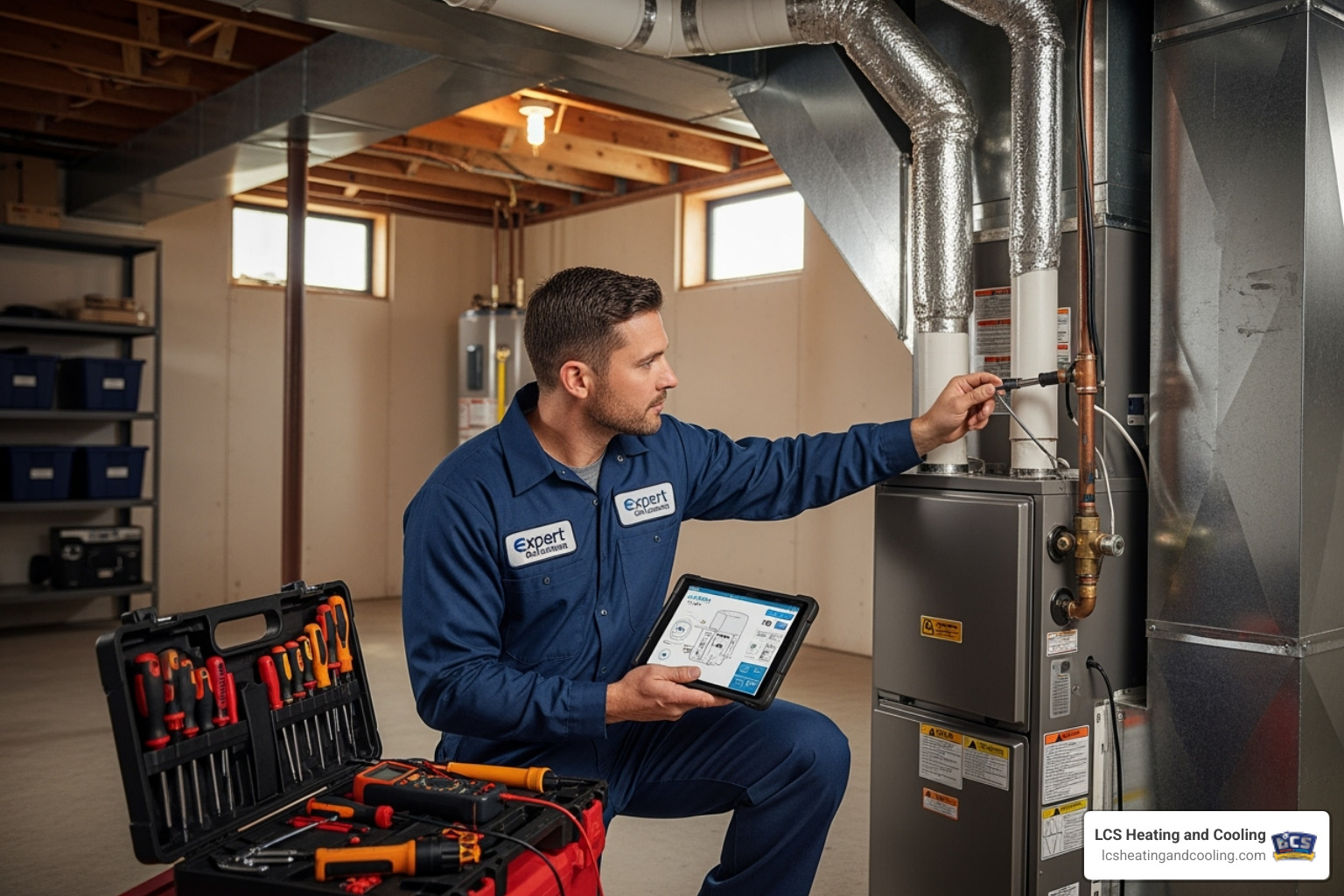
What to Expect on Installation Day
On installation day, our team will protect your home with drop cloths before carefully removing your old unit for proper disposal. The new furnace installation is performed by NATE-certified technicians who connect the system to your ductwork, fuel lines, and electrical system according to all safety codes. We'll make any minor ductwork adjustments needed for optimal airflow. Before finishing, we conduct rigorous testing and calibration to ensure every component works perfectly.
Decoding Furnace Costs and Warranties
The total cost of a new furnace includes the unit, professional labor for removal and installation, and any necessary system modifications. While higher efficiency models have a greater upfront cost, they save you money over time on energy bills.
FeatureGas FurnaceElectric FurnaceTypical Lifespan10-20 years (average 15-20 years with maintenance)20-30 years (generally longer lifespan)Unit CostGenerally mid-range upfrontOften lower upfrontOperating CostHistorically lower monthly billsCan be higher monthly bills depending on ratesInstallationMore complex (gas line, venting)Simpler (no gas line, no venting)
Look for manufacturer rebates and utility company incentives to help offset the cost. Your investment is protected by two types of warranties: a parts warranty from the manufacturer (often 10 years) and a labor warranty from the installer that covers the workmanship.
Finally, we'll do a complete walkthrough to show you how to operate your new system and thermostat, ensuring you're confident and comfortable.
Frequently Asked Questions about Furnaces
When searching for furnace shops near me, many questions come to mind. As a team serving the Indianapolis area for years, we've compiled answers to the most common ones.
How long should my furnace last?
A furnace's lifespan depends on the type and how well it's maintained. With proper care, you can expect the following:
- Gas furnace longevity: Typically 15-20 years. Regular maintenance is key to reaching the upper end of this range.
- Electric furnace longevity: These durable units often last 20-30 years due to having fewer moving parts and no combustion.
The single most important factor in maximizing lifespan is consistent annual maintenance. A yearly professional tune-up keeps your system running efficiently and reliably for longer.
What are the signs I need a new furnace?
Your furnace will usually give you warning signs before it fails completely. Look out for these red flags:
- Furnace age: If your gas furnace is over 18 years old or your electric unit is over 25, it's time to start planning for a replacement.
- Rising energy bills: A steady increase in your heating costs without a change in usage points to declining efficiency.
- Frequent repairs: If you're calling for service more than once a season, a new unit is often more cost-effective.
- Strange noises: Loud banging, squealing, or grinding sounds indicate mechanical problems that should be addressed immediately.
- Inconsistent heating: Cold spots or rooms that won't heat up suggest your furnace can no longer meet your home's demands.
- Safety issues (gas furnaces): A yellow pilot light (instead of blue) or soot around the burners are serious warnings that require immediate professional service.
How often should I have my furnace maintained?
Your furnace should be professionally maintained annually. An annual tune-up, ideally in the fall, is crucial for several reasons:
- Safety checks: A technician will inspect for gas leaks, carbon monoxide risks, and proper ventilation.
- Efficiency improvements: Cleaning and calibrating components ensures your furnace runs at peak efficiency, saving you money on utility bills.
- Preventing breakdowns: Technicians can spot and fix small issues before they become major, expensive repairs in the middle of winter.
- Warranty compliance: Most manufacturer warranties require proof of annual maintenance to remain valid.
This small yearly investment protects your system, lowers energy costs, and provides peace of mind.
Conclusion
This guide should give you the confidence to find the best furnace shops near me. The process is manageable when you focus on a few key decisions: choosing the right type, size, and efficiency level for your home and budget.
A proper Manual J load calculation is essential for correct sizing, while a high-efficiency model can provide significant long-term savings. However, the most critical decision is selecting a trustworthy local installer. Look for a company that is licensed, bonded, and insured, employs NATE-certified technicians, and offers transparent estimates and strong warranties.
The right installer combines technical skill with a commitment to your comfort, ensuring your investment delivers lasting value.
For 7-Star Concierge Service on your next furnace installation, maintenance, or repair in the Indianapolis, Carmel, Fishers, Lawrence, Noblesville, or Zionsville area, contact LCS Heating and Cooling. We are dedicated to promptness, clear communication, and streamlined processes to provide lasting comfort solutions.
Your family's comfort is too important to leave to chance. Learn more about our trusted HVAC services and find out how we can help you stay cozy all winter long!
